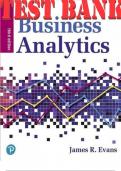Exam (elaborations)
TEST BANK for Business Analytics 3rd Edition by Evans James | All 16 Chapters
- Course
- Institution
- Book
TEST BANK for Business Analytics 3rd Edition by Evans James. ISBN 9780135231906 _TABLE OF CONTENTS_ 1. Introduction to Business Analytics o Appendix A1: Basic Excel Concepts 2. Database Analytics 3. Data Visualization o Appendix A3: Additional Windows Tools for Data Visualization and Tableau Softwa...
[Show more]




